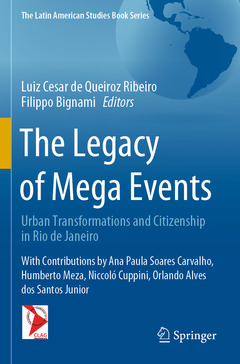Description
The Legacy of Mega Events, 1st ed. 2020
Urban Transformations and Citizenship in Rio de Janeiro
The Latin American Studies Book Series
Language: English
Subjects for The Legacy of Mega Events:
Publication date: 11-2021
192 p. · 15.5x23.5 cm · Paperback
Publication date: 11-2020
192 p. · 15.5x23.5 cm · Hardback
Description
/li>Contents
/li>Biography
/li>Comment
/li>
This edited volume offers a critical reflection on the failed experiment to redevelop the city of Rio de Janeiro according to the neoliberal strategy of entrepreneurial urban governance and mercantile regulatory transformations, which were leveraged by mega-sporting events.
Prof. Luiz Cesar de Quieroz Ribeiro and Dr. Filippo Bignami as General Editors thank Ana Paula Soares Carvalho, Humberto Meza, Niccoló Cuppini and Orlando dos Santos Junior for their contributions as co-editors of this book.
Part. I. Introduction.- Part II. Context.- Chapter 1. The sporting mega-events inside the neoliberal experiment of urban development.- Chapter 2. Rio de Janeiro economic crisis and austerity reponses.- Chapter 3. From the dream of "new middle class" to the new urban poverty.- Chapter 4. The political crisis: urban entrepreneurship without a leader class.- Part III. Facts and reasons of the failures.- Chapter 5. Decomposition of the public security system.- Chapter 6. De-gentrification, urban sprawl and social racism.- Chapter 7. Decomposition of the urban mobility system.- Chapter 8. From the promise of integration to the legacy of exclusion: Policies for favelas in Rio de Janeiro (2007 - 2017).- Chapter 9. Porto Maravilha: The defeat of the real estate-financial model.- Chapter 10. Porto Maravilha: Decomposition of the coalition and repositioning of public agents.- Part IV. Reconstruction of city project. Resistance and new ways.- Chapter 11. The experience of tenement houses as forms of resistance in Downtown.- Chapter 12. Experiments of counter-hegemonic coalitions.- Chapter 13. cultural policies in dispute; spaces of possibilities in front of Porto Maravilha.- Conclusion.




